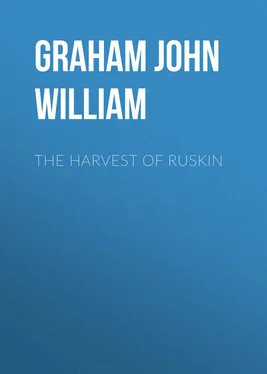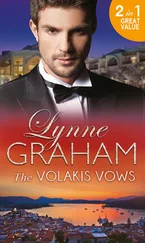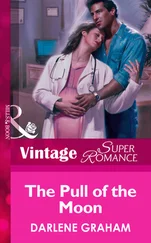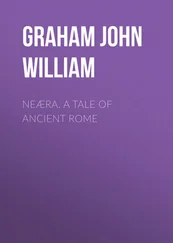John Graham - The Harvest of Ruskin
Здесь есть возможность читать онлайн «John Graham - The Harvest of Ruskin» — ознакомительный отрывок электронной книги совершенно бесплатно, а после прочтения отрывка купить полную версию. В некоторых случаях можно слушать аудио, скачать через торрент в формате fb2 и присутствует краткое содержание. Жанр: literature_19, foreign_antique, foreign_prose, на английском языке. Описание произведения, (предисловие) а так же отзывы посетителей доступны на портале библиотеки ЛибКат.
- Название:The Harvest of Ruskin
- Автор:
- Жанр:
- Год:неизвестен
- ISBN:нет данных
- Рейтинг книги:5 / 5. Голосов: 1
-
Избранное:Добавить в избранное
- Отзывы:
-
Ваша оценка:
- 100
- 1
- 2
- 3
- 4
- 5
The Harvest of Ruskin: краткое содержание, описание и аннотация
Предлагаем к чтению аннотацию, описание, краткое содержание или предисловие (зависит от того, что написал сам автор книги «The Harvest of Ruskin»). Если вы не нашли необходимую информацию о книге — напишите в комментариях, мы постараемся отыскать её.
The Harvest of Ruskin — читать онлайн ознакомительный отрывок
Ниже представлен текст книги, разбитый по страницам. Система сохранения места последней прочитанной страницы, позволяет с удобством читать онлайн бесплатно книгу «The Harvest of Ruskin», без необходимости каждый раз заново искать на чём Вы остановились. Поставьте закладку, и сможете в любой момент перейти на страницу, на которой закончили чтение.
Интервал:
Закладка:
“I continually see subscriptions of ten, fifteen, or twenty thousand pounds for new churches. Now a good clergyman never wants a church. He can say all that his congregation essentially need to hear in any of his parishioners’ best parlours, or upper chambers, or in the ball-room at the Nag’s Head; or if these are not large enough, in the market-place, or the harvest field. And until every soul in the parish is cared for, and saved from such sorrow of body or mind as alms can give comfort in, no clergyman, but in sin or heresy, can ask for a church at all. What does he want with altars? Was the Lord’s Supper eaten on one? What with pews? – unless rents for the pride of them? What with font and pulpit? – that the next wayside brook, or mossy bank, cannot give him? The temple of Christ is in His people – His order, to feed them – His throne, alike of audience and of judgment, in Heaven: were it otherwise, even the churches which we have already are not always open for prayer.” 39 39 General Statement as to the Nature and Purpose of the St. George’s Guild , p. 12, 1882.
He suggests that we can decide “who are Christ’s sheep, not by their being in any definite fold, for many are lost sheep sometimes; but by their sheeplike behaviour; and a great many are indeed sheep which, on the far mountain side, in their peacefulness, we take for stones.” 40 40 Sheepfolds : in On the Old Road , vol. ii. p. 259.
This is a delightful expression of the feeling that you may be a child of God, without having heard of the Christian Revelation of Him.
To make Baptism a sign of admission into the visible Church he says is absurd; “for we know that half the baptized people in the world are very visible rogues. Also the Holy Ghost is sometimes given before Baptism, and it would be absurdity to call a man on whom the Holy Ghost had fallen, an invisible Christian.” 41 41 Sheepfolds , p. 259.
On the Sacrament he declared to a correspondent in 1888 that he would take it from anybody’s hand, the Pope’s, the Queen’s or a hedgeside gipsy’s, and quoted Longfellow’s lines:
“A holy family, that makes
Each meal a supper of the Lord.”
He is drastic in his rejection of all Prayer Books. Prayers out of a book are no prayers to him; he cannot think that varying needs are met by routine prayer. These statements are in his Letters to the Clergy on the Lord’s Prayer and the Church (1879), reprinted in On the Old Road , p. 325, and he comments on the distrust in the efficacy of prayer likely to be produced by having to ask one day “that the rest of our lives hereafter may be pure and holy,” knowing that next day, or at least next Sunday, we shall be expected to confess that “there is no health in us.” He seriously suspects the effect of the Liturgy on the truthfulness of the English mind.
When he discusses the vital problem of the seat of Authority in religion he declares that it ultimately resides within, not in an outward Church or Book. He is absolutely uncompromising about this.
“There is, therefore, in matters of doctrine, no such thing as the authority of the Church. We might as well talk of the authority of a morning cloud. There may be light in it, but the light is not of it; and it diminishes the light that it gets; and lets less of it through than it receives, Christ being its sun. Or, we might as well talk of the authority of a flock of sheep – for the Church is a body to be taught and fed, not to teach and feed; and of all sheep that are fed on the earth, Christ’s sheep are the most simple,” likely to die in the bramble thickets; “but for their Shepherd, who is for ever finding them and bearing them back, with torn fleeces and eyes full of fear.” 42 42 Sheepfolds , p. 267.
There is also an interesting passage in The Eagle’s Nest (p. 135) on “The Light that lighteth every man that cometh into the world.”
By way of Church discipline he advises a process of excommunication by a jury of laymen. 43 43 Sheepfolds , p. 283.
What of religious decorative art? Surely here the great art critic and apostle of the Beautiful will be found on the ritualist side? Not so. He says that Church art, pictures, images, and so on, “make us believe what we would not otherwise have believed; and, secondly, make us think of subjects we should not otherwise have thought of, intruding them amidst our ordinary thoughts in a confusing and familiar manner.” “This art,” he says, “is misapplied, and in most cases, very dangerously so. Our duty is to believe in the existence of Divine, or any other, persons, only upon rational proofs of their existence; and not because we have seen pictures of them.”
“But I nevertheless believe that he who trusts much to such helps (as ‘Rafaelesque and other sacred paintings of a high order’) will find them fail him at his need; and that the dependence, in any great degree, on the presence or power of a picture, indicates a wonderfully feeble sense of the presence and power of God. I do not think that any man, who is thoroughly certain that Christ is in the room, will care what sort of picture of Christ he has on its walls and, in the plurality of cases, the delight taken in art of this kind is, in reality, nothing more than a form of graceful indulgence of those sensibilities which the habits of a disciplined life restrain in other directions. Such art is, in a word, the opera and drama of the monk. Sometimes it is worse than this, and the love of it is the mask under which a general thirst for morbid excitement will pass itself off for religion. The young lady who rises in the middle of the day, jaded by her last night’s ball, and utterly incapable of any simple or wholesome religious exercise, can still gaze into the dark eyes of the Madonna di San Sisto, or dream over the whiteness of an ivory crucifix, and returns to the course of her daily life in full persuasion that her morning’s feverishness has atoned for her evening’s folly. And, all the while, the art which possesses these very doubtful advantages is acting for undoubtful detriment, in the various ways above examined (in a previous passage), on the inmost fastnesses of faith; it is throwing subtle endearments round foolish traditions, confusing sweet fancies with sound doctrines, and enforcing false assertions with pleasant circumstantiality, until, to the usual, and assuredly sufficient, difficulties standing in the way of belief, its votaries have added a habit of sentimentally changing what they know to be true, and of dearly loving what they confess to be false.”
“Has there then (the reader asks emphatically) been no true religious ideal? Has religious art never been of any service to mankind? I fear, on the whole, not.
“More, I think, has always been done for God by few words than many pictures, and more by few acts than many words.”
“And for us all there is in this matter even a deeper danger than that of indulgence. There is the danger of Artistical Pharisaism. Of all the forms of pride and vanity, as there are none more subtle, so I believe there are none more sinful, than those which are manifested by the Pharisees of art. To be proud of birth, of place, of wit, of bodily beauty, is comparatively innocent, just because such pride is more natural, and more easily detected. But to be proud of our sanctities; to pour contempt upon our fellows because, forsooth, we like to look at Madonnas in bowers of roses, better than at plain pictures of plain things; and to make this religious art of ours the expression of our own perpetual self-complacency – congratulating ourselves, day by day, on our purities, proprieties, elevations, and inspirations, as above the reach of common mortals, this I believe to be one of the wickedest and foolishest forms of human egotism.” 44 44 Modern Painters , vol. iii. p. 57 (iv. 4) (1856).
Интервал:
Закладка:
Похожие книги на «The Harvest of Ruskin»
Представляем Вашему вниманию похожие книги на «The Harvest of Ruskin» списком для выбора. Мы отобрали схожую по названию и смыслу литературу в надежде предоставить читателям больше вариантов отыскать новые, интересные, ещё непрочитанные произведения.
Обсуждение, отзывы о книге «The Harvest of Ruskin» и просто собственные мнения читателей. Оставьте ваши комментарии, напишите, что Вы думаете о произведении, его смысле или главных героях. Укажите что конкретно понравилось, а что нет, и почему Вы так считаете.












